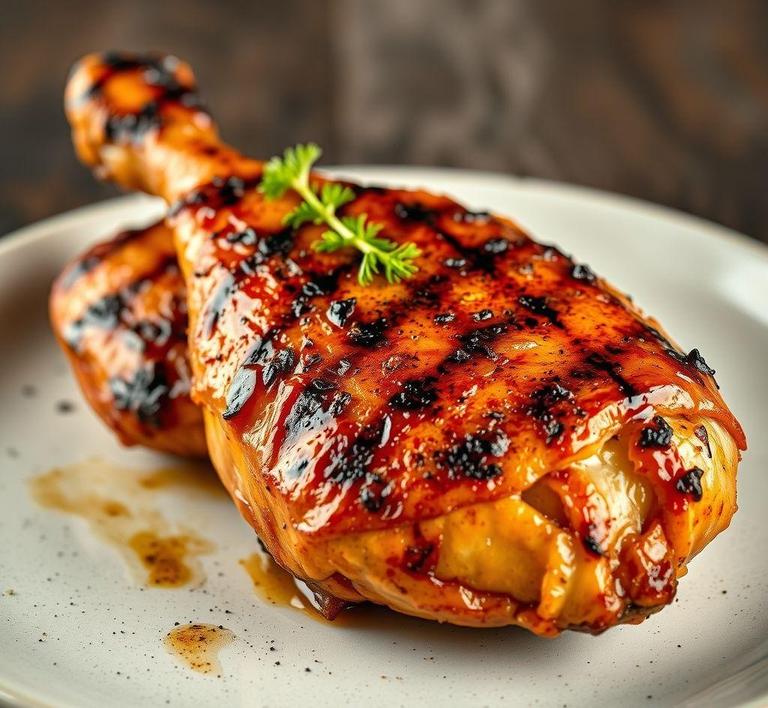If you’ve ever grilled up a big batch of chicken and ended up with leftovers, you might be wondering if it’s safe to refreeze that grilled chicken for later. The good news is, yes, you can refreeze grilled chicken, but there are a few things you need to know to make sure it’s done safely and keeps its taste and texture. In this guide, we’ll walk you through the best practices for refreezing grilled chicken, so you can avoid any food safety issues while making sure your leftovers still taste as delicious the second time around!
Can You Refreeze Grilled Chicken?

Refreezing grilled chicken is a question that often comes up for anyone who loves to meal prep or finds themselves with leftovers. The short answer is: yes, you can refreeze grilled chicken, but there are important conditions to consider before doing so to ensure food safety and maintain quality.
The primary concern with refreezing any cooked meat, including grilled chicken, revolves around the risk of bacterial growth and potential foodborne illness. Once chicken has been cooked and subsequently thawed, it enters a vulnerable state where bacteria can multiply quickly if the chicken is left out at unsafe temperatures (above 40°F or 4°C). Refreezing grilled chicken that has been left at room temperature for too long can therefore increase the risk of contamination.
Moreover, the USDA advises that cooked chicken, if properly cooled and refrigerated within two hours of cooking (or within one hour if the ambient temperature is above 90°F/32°C), can be frozen again safely. This means that the chicken should have been handled properly, stored in airtight containers or freezer bags, and refrigerated promptly to prevent bacterial proliferation.
From a food safety standpoint, the key is to ensure that the grilled chicken has not spent too long in the temperature “danger zone”, where bacteria thrive. If it has been stored correctly and refrigerated, then refreezing is safe from a microbial perspective. However, the effects on taste, texture, and overall quality require further discussion.
How To Refreeze Grilled Chicken?
Refreezing grilled chicken is a straightforward process, but following best practices will help preserve its flavor and texture as much as possible:
- Cool the Chicken Quickly: After grilling, allow the chicken to cool to room temperature but don’t leave it out longer than two hours. Ideally, transfer it to the fridge within one hour to prevent bacteria growth.
- Store Properly in the Refrigerator: Place the chicken in shallow airtight containers or wrap it tightly in aluminum foil or plastic wrap before refrigerating. This helps minimize exposure to air, which can cause freezer burn later on.
- Use Within 3-4 Days: Keep the grilled chicken in the refrigerator for no more than 3 to 4 days before refreezing. This ensures freshness and reduces the risk of spoilage.
- Wrap for Freezing: When ready to refreeze, use heavy-duty freezer bags or vacuum-sealed bags if possible. Squeeze out as much air as you can to prevent freezer burn. Label the package with the date to keep track of how long it’s been frozen.
- Freeze Quickly: Place the chicken in the coldest part of your freezer. Quick freezing helps preserve moisture and texture.
- Thaw Safely Next Time: When you want to eat the refrozen chicken, thaw it in the refrigerator or use a microwave if you plan to cook it immediately afterward. Avoid thawing at room temperature to reduce bacterial risk.
By following these steps, you can safely refreeze grilled chicken and minimize quality degradation.
Quality Impact
While it is generally safe to refreeze grilled chicken, it’s important to recognize how the process affects the chicken’s taste, texture, and overall quality. Each freeze-thaw cycle causes moisture loss and cell damage in the meat, which can lead to a few noticeable changes:
- Texture: The biggest impact is on texture. Freezing causes water inside the meat’s cells to form ice crystals, which can rupture cell walls. When the chicken is thawed, the texture may become slightly drier, more fibrous, or less tender than fresh grilled chicken.
- Moisture Loss: Each time you freeze and thaw meat, moisture escapes from the meat fibers. This can result in drier chicken, especially if it’s refrozen multiple times or stored improperly. The chicken might lose some juiciness and have a chewier bite.
- Flavor Changes: The flavor can be subtly altered by freezing, especially if the chicken was marinated or seasoned. Prolonged freezing or exposure to air (freezer burn) can cause oxidation, leading to off-flavors or a bland taste.
- Appearance: The color might fade or change slightly, and you may notice some frost or ice crystals on the surface. This doesn’t necessarily mean the chicken is unsafe to eat, but it can affect the overall eating experience.
To minimize these impacts, it’s best not to refreeze grilled chicken multiple times. Try to only freeze and thaw once if possible. Also, storing chicken in airtight packaging and freezing it quickly helps maintain the best possible quality.
Refreezing grilled chicken is safe if it has been handled correctly – meaning it was cooled promptly, refrigerated properly, and not left at unsafe temperatures. This practice can be especially convenient for managing leftovers and meal prepping without food waste.
However, repeated freezing and thawing do impact the chicken’s texture, moisture content, and flavor. For the best quality, limit the number of freeze-thaw cycles, use airtight packaging, and freeze quickly. When thawing refrozen grilled chicken, do so safely in the refrigerator to maintain food safety.
With mindful handling, refreezing grilled chicken can be a practical way to extend its shelf life and enjoy your delicious grilled meals later – just be prepared for some minor differences in texture and taste compared to freshly cooked chicken.
Is It Safe To Refreeze Grilled Chicken?
Refreezing grilled chicken is a topic that often raises eyebrows, primarily because of concerns about food safety and quality. The short answer is: yes, but only under certain conditions.
When grilled chicken is cooked properly and then cooled quickly, it can be safely frozen and refrozen, but with some important caveats. The key factor here is temperature control. Bacteria thrive when food is left in the ‘danger zone’ – between 40°F (4°C) and 140°F (60°C) – for too long. If the grilled chicken was thawed in the refrigerator and kept at safe temperatures (below 40°F), and not left out for extended periods, then refreezing is generally safe.
However, if the grilled chicken has been left out at room temperature for more than two hours, or if it was thawed using unsafe methods (like on the counter or in warm water), then refreezing can be risky because harmful bacteria may have multiplied, and freezing doesn’t kill all bacteria – it just halts their growth temporarily.
From a quality standpoint, refreezing grilled chicken multiple times can degrade its texture and flavor. Each freeze-thaw cycle causes moisture loss, making the meat dry and less palatable. So, while it can be safe, frequent refreezing is not ideal for taste.
Signs That Grilled Chicken Should Not Be Refrozen
Knowing when not to refreeze grilled chicken is just as important as knowing when it is safe. Here are some key warning signs that mean you should avoid refreezing:
- Unpleasant Odor: A sour, rancid, or otherwise off smell indicates bacterial growth or spoilage, and the chicken should be discarded.
- Slimy or Sticky Texture: Fresh grilled chicken should have a firm, slightly moist texture. A slimy or tacky surface signals spoilage.
- Change in Color: If the chicken has turned grayish or greenish, or developed dark spots, it’s a clear red flag.
- Left Out Too Long: If the chicken has been sitting out at room temperature for over two hours (or over one hour in hot climates above 90°F/32°C), bacteria may have multiplied to dangerous levels.
- Previously Thawed Improperly: Chicken that was thawed outside the refrigerator (in warm water, microwave, or at room temperature) and then refrigerated should not be refrozen without cooking it again.
In any of these cases, refreezing the chicken poses a risk of foodborne illness, so it’s safer to discard it.
Common Refreezing Mistakes
Even when you know it’s safe to refreeze grilled chicken, people often make mistakes that compromise safety or food quality:
- Refreezing Without Cooling: Placing warm or hot grilled chicken directly into the freezer without cooling it first. This raises the freezer temperature, affecting other stored foods and promoting bacterial growth.
- Multiple Freeze-Thaw Cycles: Refreezing chicken multiple times accelerates moisture loss and texture degradation, making the meat dry, tough, and less tasty.
- Not Using Airtight Packaging: Failing to use airtight, freezer-safe packaging leads to freezer burn – those dry, tough patches caused by air exposure, ruining flavor and texture.
- Ignoring Time Limits: Frozen grilled chicken should ideally be consumed within 4 months for best quality. Beyond that, while still safe, texture and flavor decline.
- Cross-Contamination: Using the same utensils or containers that were in contact with raw chicken for refreezing without proper cleaning can spread harmful bacteria.
Tips And Tricks
To ensure your grilled chicken remains safe and tasty after refreezing, keep these tips in mind:
- Cool Quickly: After grilling, allow the chicken to cool to room temperature (no longer than two hours) before refrigerating or freezing. For faster cooling, slice larger pieces or spread out the chicken.
- Use Proper Storage: Wrap grilled chicken tightly in plastic wrap or aluminum foil, then place it in a heavy-duty freezer bag or airtight container. Remove as much air as possible to prevent freezer burn.
- Label and Date: Always label your frozen chicken with the date of freezing. This helps you track how long it’s been stored.
- Thaw Safely: When ready to use, thaw frozen grilled chicken in the refrigerator overnight, never on the counter. For quick thawing, use the microwave or cold water bath, but cook immediately afterward.
- Reheat Thoroughly: When reheating previously frozen grilled chicken, ensure it reaches an internal temperature of 165°F (74°C) to kill any bacteria.
- Plan Ahead: To avoid multiple refreezing cycles, try to portion your grilled chicken before freezing so you only thaw what you need.
Conclusion
Refreezing grilled chicken can be perfectly safe, but it hinges on careful handling. Maintaining strict temperature control, spotting signs of spoilage, and avoiding common mistakes ensures food safety and preserves taste and texture. When done right, you can enjoy the convenience of having grilled chicken ready to go, reducing waste and saving time in the kitchen.
Remember, the golden rule is: when in doubt, throw it out. Your health is worth the extra caution.


